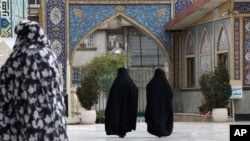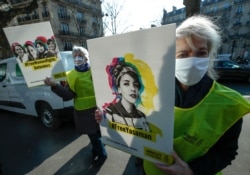The United States has reiterated its concern about Iran’s poor human rights record in its first official comment on the Islamic republic’s election last week to the United Nations’ top legislative body on women’s rights. But it fell short of the explicit denunciation of the outcome that many rights advocates had hoped for.
The remarks, which were provided to VOA on Thursday and largely repeated later at a State Department briefing, mark the United States' stand on the election of Iran to the U.N.’s Commission on the Status of Women.
In the April 20 secret ballot, 43 of the 54 nations in the U.N. Economic and Social Council (ECOSOC) elected Iran to the commission for a four-year term beginning next year. The commission is the U.N.'s main intergovernmental body dedicated to the "promotion of gender equality and the empowerment of women."
Iran, which is not currently a member of the commission, was one of five Asian nations nominated by ECOSOC's Asia group for seats on the body, with the others being China, Japan, Lebanon and Pakistan. All five were elected to the commission by a majority of ECOSOC nations, although Iran received the smallest number of votes.
In a statement emailed to VOA Persian on Thursday, a State Department spokesperson said, "The unopposed candidacies of countries that engage in torture, abuse, and violations of human rights and due process was a troubling feature of this election."
Each regional group in ECOSOC typically nominates one country for each seat allotted to it in bodies such as the women's commission, meaning there is no competition among the nominated states. But in last week's proceedings, the U.S. exercised its authority as an ECOSOC member to call for a vote on the Asia group's nominated states anyway.
"That is why the United States called for the vote on the Commission on the Status of Women, specifically to allow countries to register their opposition," the spokesperson wrote.
"The United States supports candidates in the U.N. system that seek to contribute positively to its work and mission and reinforce the foundational values of the U.N. system, including human rights. We continue to call on regional groups to put forward candidates with strong human rights records for these U.N. bodies," the statement concluded.
At Thursday's State Department press briefing, spokesman Ned Price repeated much of the written statement sent earlier to VOA concerning the U.S. reaction to the vote. When pressed about what the U.S. thinks of Iran becoming a member of the women's commission, he added, "Iran would qualify for much of what I just said, (as being among) countries that have very troubling records, deeply disturbing records."
Iran's poor record on women's rights was under fire at the world body as recently as last month. In his annual address to the U.N. Human Rights Council, Javaid Rehman, U.N. Special Rapporteur on Human Rights in Iran, noted "some positive steps" for Iranian women and girls in education and in citizenship rights. But he said "egregious gender-based discrimination persists in law, practice and societal attitudes, disempowering women and girls from participating and contributing in society."
Hillel Neuer, executive director of Geneva-based UN Watch, commended the Biden administration for forcing last week's U.N. vote for the Asian members of the commission. But he told VOA Persian that Thursday's U.S. statement about the vote was "feeble" and "conveyed a lack of resolve by an administration that pledges to carry the banner of human rights."
Neuer noted that when Iran last was elected to a seat on the women's commission in 2014, then-U.S. President Barack Obama's U.N. Ambassador Samantha Power denounced the outcome as an "outrage."
Neuer said that in 2010, the Obama administration also coordinated with its allies to block Iran from winning an election to another U.N. body: the executive board of the U.N. Entity for Gender Equality and the Empowerment of Women, an umbrella agency of 2,000 U.N. employees working on women-related issues.
"The Biden administration’s refusal to condemn Iran's election to the commission is a failure of leadership and a marked departure from what the Obama administration did," Neuer said.
The U.S. statement also drew a critical response from Gabriel Noronha, a former State Department special adviser on Iran under President Joe Biden's predecessor Donald Trump.
"The State Department still won't say whether it voted for Iran, won't criticize Iran's accession to the commission, and hasn't once condemned the regime's treatment of women beyond language buried in the mandatory annual U.S. human rights report," Noronha told VOA Persian.
"My fear is that the United States will continue to sell out the Iranian people so long as they are pursuing a nuclear deal with Iran," Noronha added.
After decades of U.S.-Iranian hostility, the Biden administration began indirect talks with Iran through European mediators in Vienna earlier this month. Both nations have called it an effort to bring each other back into compliance with a 2015 nuclear deal called the Joint Comprehensive Plan of Action (JCPOA), a deal from which Trump withdrew in 2018 and which unraveled further the following year when Iran began openly defying its limits on nuclear activities that could be weaponized.
Atlantic Council analyst Barbara Slavin, who has supported the Biden administration's bid to revive the JCPOA, told VOA Persian that she interpreted its statement on the U.N. vote as "strongly suggesting" that the U.S. opposed Iran's candidacy for the women's commission.
"Given the delicate timing — talks in Vienna, upcoming Iranian elections, leaked (audio) tape of Iranian Foreign Minister Mohammad Javad Zarif — I am assuming that the Biden administration didn't want to give political ammunition to anyone in Iran," Slavin said. "But the statement is far too diplomatic-speak for my taste," she added.
Roya Boroumand, co-founder of Washington-based rights group Abdorrahman Boroumand Center, told VOA Persian she was troubled by the absence of U.S. officials' comments expressing outrage about Iran's election to the U.N. commission "at a time when scores of women's rights advocates are serving hefty prison terms in Iran."
This article originated in VOA's Persian Service.





